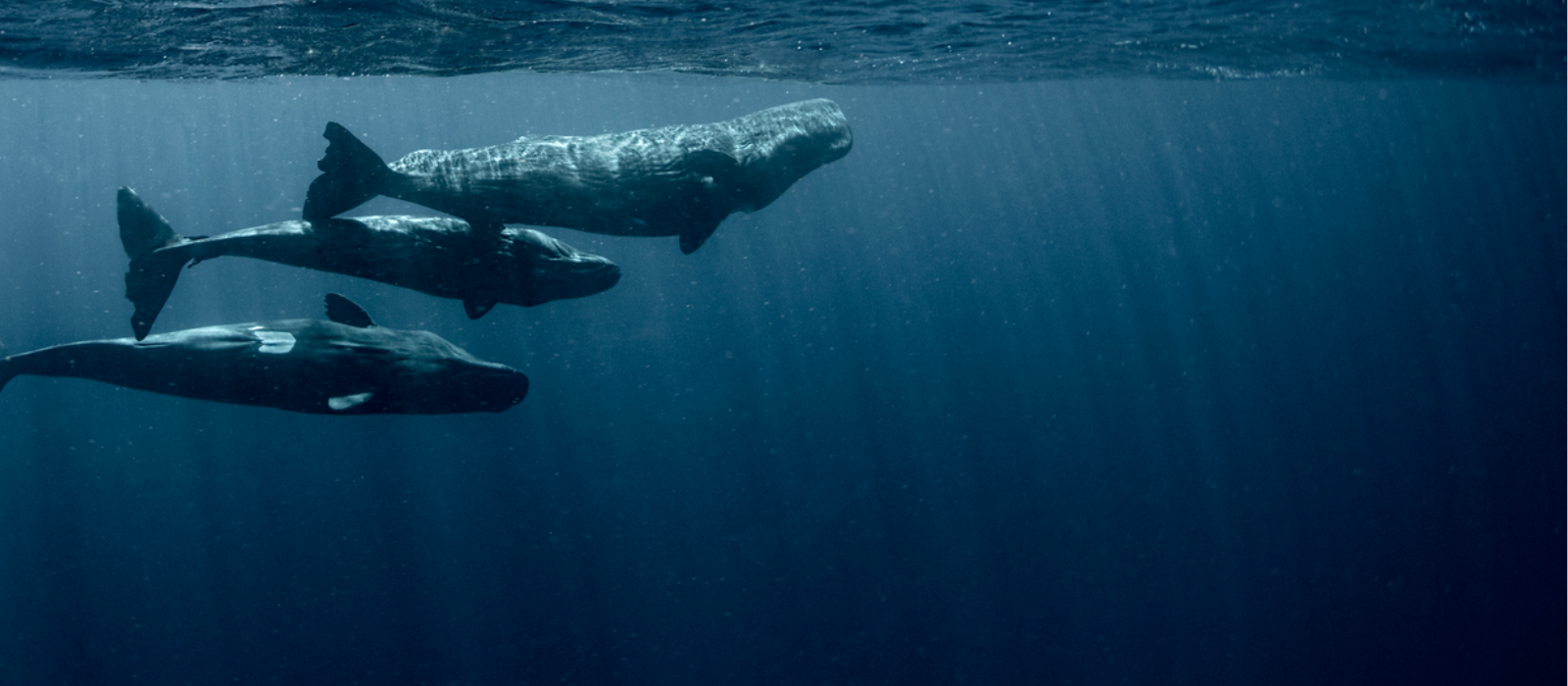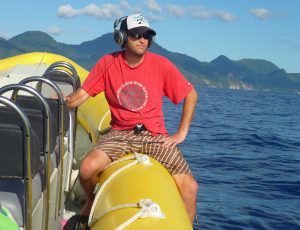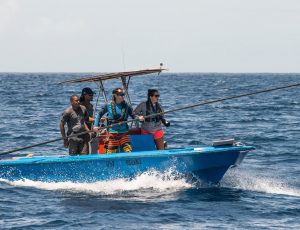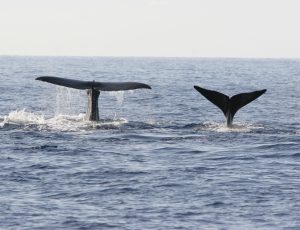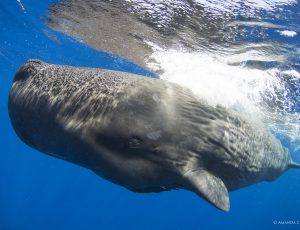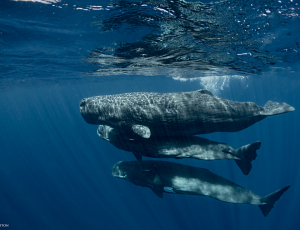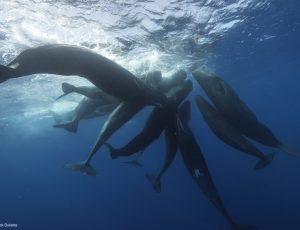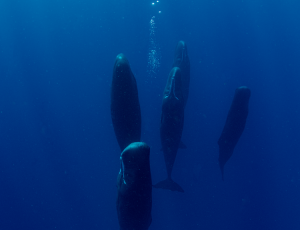by Nathaniel Whelan
Despite their cultural prominence in works like Herman Melville’s Moby Dick, sperm whales are a scientific enigma. We possess limited knowledge about them in comparison to bottlenose dolphins, orcas, or humpback whales. It’s even a challenge to estimate their global population because they live so far from shore. This is one of many reasons why Dr. Shane Gero has dedicated his professional career to studying these magnificent animals.
Shane is a current scientist-in-residence at Carleton University. He is a leader in cetacean biology, whose long-standing research on sperm whales has led to a shift in our understanding of whale communities and communications. He is also the lead of the biology team for Project CETI.
Founded in 2020, Project CETI is a nonprofit organization applying advanced machine learning and state-of-the-art robotics to listen to and translate the communication of sperm whales in Dominica, an island nation in the Caribbean.
Project CETI initially got off the ground when marine biologist Dr. David Gruber approached Shane with an opportunity to advance his research and seek further funding. Shane’s first responsibility: inspire a group of assembled scientists at Harvard’s Radcliffe Institute for Advanced Study on why understanding whale talk is a worthy pursuit.
The Dominica Sperm Whale Project
Shane’s background with sperm whales began in 2005 when he was a graduate student under the guidance of Dr. Hal Whitehead, a professor at Dalhousie University and one of the foremost researchers into the subject at the time.
His research took him off the coast of Dominica, where he quickly fell in love with the people, their culture, and the large whale population. After continuing his work with Hal as a PhD student, Shane founded the Dominica Sperm Whale Project (DSWP), an innovative study that allowed him to further expand upon the questions he started asking a few years earlier.
Dominica offered an ideal spot for Shane to conduct his research because of its calm waters, proximity to the shoreline, and a notable occurrence of high birth rates. But most importantly, whale families exhibited lengthy residency times.
In the Galapagos where Hal spent 30 years of his career, whales would move on after only two weeks, whereas in Dominica, they stayed for prolonged periods and always returned. Having dedicated himself to the region, this provided Shane a unique opportunity to study the whales at an individual level for an indefinite length of time.
“We’re at a place many years later where we have whales that we studied as babies who are now having babies of their own. That makes for some very powerful science.”
-Dr. Shane Gero
The dataset from DSWP served as the springboard for Project CETI’s current mission.
Why Should We Listen?
Almost overnight, the onset of Covid-19 forced us to set clear boundaries in terms of who’s in our bubble, and who’s not. As such, the pandemic shrunk our definition of “us.”
Even though Covid-19 has subsided, we still face several significant challenges, such as climate change and sea level rise. It’s easy to view these as human issues, but being out in a small boat off the coast of Dominica with a 360 degree horizon always reminds Shane that Earth is an ocean world. This means adopting a more inclusive mindset and expanding our bubble not just beyond our own individual experiences, but our entire species as well.
“We see sperm whales as being fundamentally different, but in truth, if we just pay attention, what’s important to them sounds surprisingly familiar: love your family, be a good neighbour, survival and resiliency.”
-Dr. Shane Gero
For Shane, this is the big story to come out of his research. Adult sperm whales can span the size of two buses and weigh up to ten, and yet, we share a set of core values.
Sperm whales live in multicultural societies and have strong multigenerational family bonds. Because they have the largest brain of any species, they are also capable of high-level functions, such as conscious thought and future planning, as well as feelings of compassion, suffering, and intuition.
Furthermore, their vocalizations, which are among the loudest animal sounds on the planet, have a Morse code-like structure that shares the hallmarks of a highly evolved language.
Our understanding of these great creatures is still in its infancy, but it is because of the efforts of DSWP and now Project CETI that we have begun to unravel the mystery.
The Project CETI Team
Similar to sperm whales, family is very important to Shane. He has three boys and recently moved to Ottawa to be closer to the grandparents. When funding came through to bring students onto the project, he contacted a number of universities in search of a space to work. Carleton was one of the first to jump on board.
While Shane is based in Canada, Project CETI is an international initiative and involves collaborators from all over the world, including Denmark, Israel, the United Kingdom, and the United States.
From the start, the core team recognized that this study lay beyond any particular domain. Since 2020, its inspiring question has brought in scholars from various disciplines who would never typically share a common interest in sperm whales.
“The same way I try to build the various families of whales by observing them, we built this family of researchers from all over the world. That’s why CETI is a success – it’s a team of scholars from many different fields that see something uniquely valuable in a single project.”
-Dr. Shane Gero
The team consists of leading experts in artificial intelligence, cryptography, linguistics, machine learning, marine biology, natural language processing, robotics, and applied underwater acoustics.
“The irony of our first year together is that while we were all trying to understand what the whales were saying, we were also learning to understand each other,” Shane jokes.
But, he admits, that has been one of the most exciting aspects about this endeavour, encouraging others to branch out from their own fields and develop a wider scientific perspective.
By the end of the year, there is estimated to be more than 50 team members worldwide.
Technology for Good
People have always wondered what animals are saying, and now we are closer than ever to attaining that reality. To observe and translate sperm whale communications, Project CETI records their sound and movements, and then analyzes the data using advanced tools from machine learning and linguistics.
Their philosophy is to be as minimally invasive as possible. As a result, they are employing some of the most gentle robotics in the world, including small high-tech suction cup computers, swimming robots, and hundreds of synced underwater microphones. Aerial drones are also being extensively used.
“For the first time in history, advances in technology have made it possible to understand the communication of animals. We at Project CETI are unified by the shared goal of applying this tech to amplify the magic of our world and bring us closer to nature.”
-Dr. David Gruber, Founder of Project CETI
At the centre of their mission is a human quest for understanding, one that involves using high-powered tools in a realm outside of the one for which they were initially developed.
Thinking about the future, David is aware of how Project CETI’s work could potentially shift our perspective of life on Earth. While he stresses the importance of proper public discourse, he also emphasizes that new information about whales could bolster efforts in ocean conservation and help protect marine mammals and underwater habitats.
Conclusion
Growing up the son of a diplomat, Shane travelled all over the world. Living outside the language, he was always fascinated with who was friends with who and why. Looking back, he sees the study of animal social relationships as an extension of that.
Since 2005, Shane has spent thousands of hours in the company of sperm whales.
“My career has been driven by what I call the burden of trust. These animals have put a ton of faith in me, and for that, I feel a responsibility to do good science. It has been an incredible privilege spending time with them and getting to know them as individuals. I’m so grateful for this experience.”
To learn more about Project CETI, please visit their website.
Banner image courtesy of Amanda Cotton.
